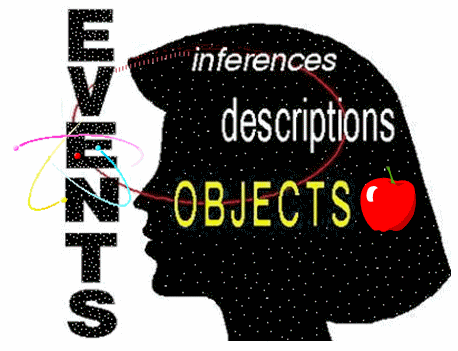

98.6 and other
Misleading Generalities
Written 1996 by Steven Lewis
I was lecturing on control systems theory to my anatomy - physiology students, and I made an analogy to temperature regulation in our homes. I said that we can set our thermostat to a particular temperature, and the control system will work to keep room temperature near that set point. I asked my students if we had a body set point for temperature, and several replied that we did. I asked what they thought the value of the body set point to be, and a couple blurted out 98.6. At that response I contracted my frontalis muscle, thereby elevating my eyebrows, and asked the class how literally they believed in a normal body temperature of 98.6.
At that point my training of the class in general semantics began to pay off. One student responded, "No, different people can have different normal temperatures." I responded that my normal oral temperature seldom exceeded 98.2 unless I had been exercising or sick. Another student volunteered that temperature varied within an individual depending on where in the body we took the temperature. I reinforced her comment by noting that rectal temperature usually was higher than oral temperature by about 1 degree F. The temperature of some internal organs, like the liver, may be several degrees above oral temperature.
Other students noted that body temperature can vary in us depending on the time of day we take the temperature, our activity level and whether we are ill. I noted that when we are ill, and running a fever, the body defends a higher temperature. That's why we shiver during the onset of a major fever. The body by shivering generates heat at a faster than normal rate, bringing body temperature up.
I noted, too, that the original Fahrenheit temperature scale was set so that 0 degrees would reflect the coldest reproducible temperature and 100 degrees reflected normal oral body temperature. A couple hundred years later we can reproduce temperatures far below zero and our measurement of normal oral temperature is usually less than 100 degrees thanks to improvements in our thermometers.
I summed up our discussion on temperature by repeating the principle of individuality (non-identity) for the class. They have grown quite accustomed to this principle by now.
Meanwhile, many who are new to or just dabbling in general semantics treat its principles with the same naivety as beginning A&P students treat normal body temperature. They take the extensional principles of Korzybski and apply them intensionally (rigidly). They know some of the terms, but have little appreciation of their significance and so do not apply them appropriately in a specific context.
Those who are new to the korzybskian system tend to pick up some of the korzybskian lingo and superimpose it onto their intensional evaluation habits without troubling to change these habits. They assume that because they use the words (or avoid using certain words) that they are doing general semantics. Much of the literature of general semantics gives me the impression that Korzybski was more concerned with how we talk than with our non-verbal evaluations. Yet Korzybski stated many times throughout his writings that his primary interest was in changing (extensionalizing) our non-verbal reactions. His suggestions regarding changes in our linguistic habits were for the purpose of triggering desireable changes in these non-verbal reactions, which he called "semantic reactions." Curiously, the term "semantic reaction" is seldom used by writers on gs, no doubt in part because they do not appreciate its significance.
According to Korzybski:
-
"Mere verbal formalism is not enough, because the full non-elementalistic meanings to the patient are not divulged; consequently, in such a case, the s.r are not affected, and the treatment is a failure." (S&S p25)
"It is not only useful, but perhaps essential, that the reader should stop in such places and try to evoke in himself the given s.r. The present work leads to new s.r which are beneficial to every one of us and fundamental for sanity. The casual reading of the present book is not enough. Anyone who wants the full or partial benefit of the joint labours of the author and the reader must, even in the reading, begin to re-train his s.r." (S&S p26)
"The present theory can only be fully beneficial when the reader acquires in his system the habitual feeling of both the vertical and the horizontal stratifications with which identification becomes impossible." (S&S p396)
The major goal of the korzybskian system was the development in us of a semantic (nonverbal) state called "consciousness of abstracting." Korzybski suggested the use of visual aids like the Structural Differential, several linguistic extensional devices like dating and indexes, some specialized terminologies like "abstracting," and the avoidance of certain misleading formulations including the "is" of classification and predication as means of training toward this new semantic state. The altered linguistic habits were not the goals of his system. They were means to help bring about an extensional semantic state. Once that special semantic state is achieved, terms like the "is of identity," "time," "space," class names and names of individuals will be evaluated differently. This is because meanings and evaluations are in us; they are not intrinsic (identical) to the words and events that evoke them.
Go to General Semantics Home Page ||| Go to Steven Lewis Home Page